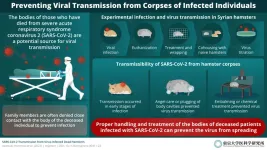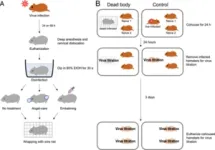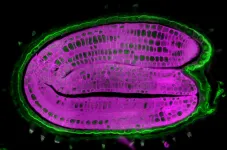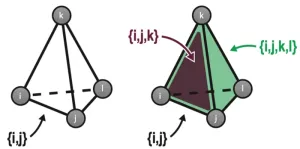Scientists suggest guidelines to prevent SARS-CoV-2 transmission from deceased individuals
2023-03-07
(Press-News.org) Their findings highlight that embalming or "angel care" can effectively prevent virus transmission, to allow family members to say goodbye
During the pandemic, COVID-19 control measures in several countries prevented family members from coming into contact with loved ones who died from the infection. This had an impact on cremation practices and caused emotional distress. Researchers from Japan have now shown that, while deceased SARS-CoV-2-infected individuals may be a potential source of the virus, transmission can be stopped by using appropriate procedures. Their research provides evidence for national guidelines.
The coronavirus disease 2019 (COVID-19) pandemic has presented unique challenges for clinicians, patients, and families. Of these, the death and loss of a loved one has been the one of the most painful and overwhelming. This psychological stress is compounded by the inability to see loved ones one last time and perform cremation rituals, due to the restrictions around exposure to the bodies of patients who died as a result of COVID-19. Many medical facilities still refuse to allow bereaved family members to perform cremation for those who died from the infection. However, there is a lack of evidence to support these restrictions, and their acceptability varies between countries.
There have been reports of infectious severe acute respiratory syndrome coronavirus 2 (SARS-CoV-2) being found in individuals who died from the infection. However, it is unclear whether the virus can be transmitted from their bodies. In Japan, nurses perform postmortem care or "angel care" for deceased persons by wiping their surfaces and shaving or applying chemicals. In addition, the body openings are plugged with cotton pads to prevent bodily fluid leakage. In contrast, “embalming” or the treatment of a body to keep it from decaying, is common in the United States and Canada, and has recently become popular in Japan. How these practices impact the risk of infection from deceased persons, particularly for infection with SARS-CoV-2, is unknown.
To fill this knowledge gap, a research team from Japan has analyzed the possibility of SARS-CoV-2 transmission from a deceased individual's body by using a hamster model. They analyzed whether the virus can spread from COVID-19-infected dead hamsters, and whether this spread can be reduced by using angel care and embalming. Their recent work was published in mSphere on 10 January 2023. Sharing the motivation behind their investigation, Prof. Kawaoka states, “It has been two and a half years since the COVID-19 pandemic began, and the transmissibility of SARS-CoV-2 from the body of a deceased, infected person still remains unclear.”
The researchers infected Syrian hamsters with SARS-CoV-2/UT-NCGM02/human/2020 (the Wuhan strain of the virus) before euthanizing them and treating the bodies with either angel care or embalming (7% formaldehyde and 4% glutaraldehyde) treatment. As a control, one group of hamster bodies was treated with alcohol and wrapped in wire nets. Healthy hamsters were then co-housed with the bodies for 24 hours and their organs were collected to check for transmission of the virus.
high SARS-CoV-2 titers were found in the lungs and nasal turbinate of some hamsters who shared a house with a dead infected hamster, implying a risk of infection. In contrast, angel care was effective in preventing the leakage of gas and bodily fluid leakage from the bodies, effectively preventing infection of the co-housed hamsters. Embalming also prevented the transmission of virus to any of the live hamsters. Prof. Kawaoka explains, “Infectious viruses may be transmitted via postmortem gases produced during the decomposition process or other postmortem changes in the dead body. Angel care or embalming could prevent this transmission.”
In summary, these findings emphasize the importance of avoiding infection when handling the body of a deceased individual who had SARS-CoV-2 infection, and that sealing body cavities can control virus spread even if embalming is not performed. Prof. Kawaoka concludes by saying, "We do know that the virus remains in the bodies of deceased persons, but with appropriate precautions and guidelines, we can at least let the families see their loved ones once before they depart."
These findings could guide local and national guidelines on funerary rites and provide a modicum of solace to those who lose loved ones to COVID-19.
END
[Attachments] See images for this press release:


ELSE PRESS RELEASES FROM THIS DATE:
2023-03-07
Germination is a crucial stage in the life of a plant as it will leave the stage of seed resistant to various environmental constraints (climatic conditions, absence of nutritive elements, etc.) to become a seedling much more vulnerable. The survival of the young plant depends on the timing of this transition. It is therefore essential that this stage be finely controlled. A Swiss team, led by scientists from the University of Geneva (UNIGE), has discovered the internal thermometer of seeds that can delay or even block germination if temperatures are too high for the future seedling. This work could help optimize plant growth in a context of global warming. These results can be ...
2023-03-07
A commonly used scientific method to analyze a tiny amount of DNA in early human embryos fails to accurately reflect gene edits, according to new research led by scientists at Oregon Health & Science University.
The study, published today in the journal Nature Communications, involved sequencing the genomes of early human embryos that had undergone genome editing using the gene-editing tool CRISPR. The work calls into question the accuracy of a DNA-reading procedure that relies on amplifying a small amount of DNA for purposes of genetic testing.
In addition, the study reveals that gene editing to correct disease-causing mutations in early human embryos can also lead to unintended ...
2023-03-07
LOS ANGELES — Keck Medicine of USC has named Ikenna (Ike) Mmeje president and CEO of USC Arcadia Hospital (USC-AH), effective March 13.
In this position, Mmeje will further the health system’s mission to expand access to specialized health care and research to the San Gabriel Valley and beyond. He will oversee all management and operations of the hospital, including corporate compliance, strategic plan implementation and fundraising.
“Mmeje will utilize his wealth of knowledge and experience running complex, high-performing hospitals in his new role leading USC Arcadia Hospital,” said Rod Hanners, CEO of Keck Medicine.
Mmeje replaces current ...
2023-03-07
Computer models are an important tool for studying how the brain makes and stores memories and other types of complex information. But creating such models is a tricky business. Somehow, a symphony of signals – both biochemical and electrical – and a tangle of connections between neurons and other cell types creates the hardware for memories to take hold. Yet because neuroscientists don’t fully understand the underlying biology of the brain, encoding the process into a computer model in order to study it further has been a challenge.
Now, ...
2023-03-07
Plants convert light into a form of energy that they can use – a molecule called adenosine triphosphate (ATP) – through photosynthesis. This is a complex process that also produces sugar, which the plant can use for energy later, and oxygen. Some bacteria that live in the light-exposed layers of water sources can also convert light to ATP, but the process they use is simpler and less efficient than photosynthesis. Nonetheless, Technion - Israel Institute of Technology researchers now find this process isn’t as straightforward and limited as was previously thought.
Rhodopsins are the light-driven proton pumps ...
2023-03-07
1. Commercial water purification system may have caused pathogen infection in 4 hospitalized patients
Abstract: https://www.acpjournals.org/doi/10.7326/M22-3306
URL goes live when the embargo lifts
A study of 4 cardiac surgery patients in one hospital found that they developed Mycobacterium abscessus infections, a multidrug-resistant nontuberculous mycobacteria, potentially due to a commercial water purifier. The water purifier had been installed in the hospital to improve water palatability but was inadvertently removing chlorine from the supply lines feeding ice and water machines in the affected area of ...
2023-03-07
B. Hadley Wilson, MD, FACC, is the new president of the American College of Cardiology. Today marks the first day of his one-year term leading the global cardiovascular organization in its mission to transform cardiovascular care and improve heart health.
“Some of the best qualities of the ACC and its members are the commitment to patient care and the shared vision of a world where science, innovation and knowledge optimize and transform cardiovascular care and outcomes for all,” Wilson said. “I believe we all really practice what we preach. I am honored to lead an organization dedicated to innovating ...
2023-03-07
Beginning today, Nicole L. Lohr, MD, PhD, FACC, will serve as chair of the American College of Cardiology Board of Governors (BOG) and secretary of the Board of Trustees. Her term will run one year from 2023-2024.
Lohr will lead governors from chapters representing all 50 states, the District of Columbia, Puerto Rico, Canada, Mexico and representatives from the U.S. health services. The BOG is the grassroots governing body of the ACC, a nonprofit cardiovascular medical society representing over 56,000 cardiologists and cardiovascular care team members around the world.
“I have spent the last 11 years finding ways to get involved in my ACC state chapter and in various ACC councils, ...
2023-03-07
Sexual minority families—where parental sexual orientation or gender identity is considered outside cultural, societal, or physiological norms—fare as well as, or better than, ‘traditional’ families with parents of the opposite sex, finds a pooled data analysis of the available evidence, published in the open access journal BMJ Global Health.
Parental sexual orientation isn’t an important determinant of children’s development, the analysis shows.
The number of children in families with lesbian, gay, bisexual, transgender ...
2023-03-07
Frequent socialising may extend the lifespan of older people, suggests a study of more than 28,000 Chinese people, published online in the Journal of Epidemiology & Community Health.
Socialising nearly every day seems to be the most beneficial for a long life, the findings suggest.
In 2017, 962 million people around the globe were over 60, and their number is projected to double by 2050. Consequently, considerable attention has focused on the concept of ‘active’ or ‘successful’ ageing, an important component of which seems to be an active social life, note the researchers.
But most of the evidence for the health benefits of socialising ...
LAST 30 PRESS RELEASES:
[Press-News.org] Scientists suggest guidelines to prevent SARS-CoV-2 transmission from deceased individuals




